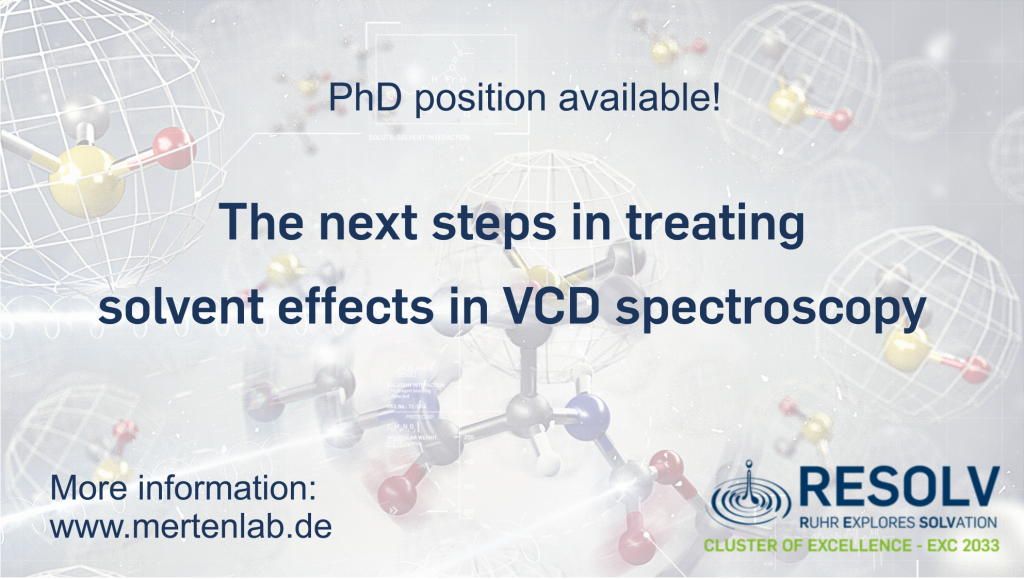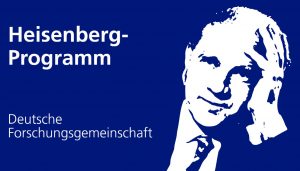The project:
Vibrational circular dichroism (VCD) spectroscopy has become a mature tool for the determination of absolute configurations (ACs; see our recent review paper). Besides high quality experimental data, such determinations require DFT-based spectra predictions, for which all populated conformers of the target molecule need to be considered. For small molecules, there are established routines if self-aggregation or, in case of polar solvents, solute-solvent interactions do not need to be considered. With increasing complexity of the investigated compounds, however, solubility in non-polar chloroform (the preferred solvent for VCD studies) often becomes limited, so that more polar solvents such as ACN or even DMSO must be used to record the experimental spectra. In these cases, the IR and VCD spectra often have to be simulated by assuming explicit interactions of the chiral molecule with one or more solvent molecules following a micro-solvation approach, which becomes even more difficult with increasing number of conformational degrees of freedom. While this is a common procedure, each study yet requires individual treatment of solvent effects and explicit solvent molecule placement is so far done by hand. Despite few systematic investigations that target solvent effects (see for instance our papers on chiral carboxylic acids MPAA and PPA or on chiral alcohols with one OH group, chiral diols and alcohols of varying structural complexity), there do not exist semi-automatic procedures or at least reliable guidelines on treating these cases more efficiently from the start of the spectra analysis.

The main goal of this project is the development of a computational procedure to tackle solvent effects efficiently and ideally automatically and thereby to accelerate and simplify AC determination of complex molecules. Various parameters will be evaluated that have the potential to guide solvent placement (ranging from simple automated placement near H-bond donors and acceptors to interfacing algorithms such as EC-RISM). These placement procedures will be complemented with conformational search algorithms and fast intermediate geometry optimization routines. In order to benchmark the computational approaches, experimental IR and VCD spectra will be recorded for small series of structurally related molecules but also for drug-like compounds, that represent the real-life cases.
The offer:
The candidate will join the lab of Prof. Dr. Christian Merten, an international team of physical organic chemists with research interests ranging from supramolecular chemistry to spectroscopy under cryogenic conditions. Our home is the Faculty of Chemistry and Biochemistry at Ruhr University Bochum, one of the largest research-focused universities in Germany. Spread over more than 30 research groups from various areas of chemistry, the Faculty has more than 200 PhD students from around the world. Information on admission guidelines to the PhD programme can be found on the Faculty’s website.
The PhD position (salary according to TVL 13, 50%) is funded for three years through the Cluster of Excellence RESOLV (“Ruhr Explores Solvation”), which offers a vivid research environment focused on Solvation Science. The candidate will join the integrated Graduate School Solvation Science (iGSS), which provides excellent study opportunities such as a fully financed mandatory 3-month research stay abroad, annual workshops, annual travel grants to visit conferences, soft skill courses, …
The candidate’s profile:
Candidates should hold a Masters degree in Chemistry (or equivalent) and have a solid background in physical, physical-organic and/or computational chemistry. High self-motivation is equally important as the ability to work in a team. Experience in quantum-chemical calculations and basic scripting (Phyton or equivalents) is required. Despite the strongly computational nature of the project, a general interest in running VCD spectroscopic measurements is expected. Synthesis skills are not required.
The application:
The position is to be filled as soon as possible, the latest starting date is October 1st, 2021. Please apply by email directly to Prof. Christian Merten (recruiting@mertenlab.de; Re: PhD application computational spectroscopy). Applications will be constantly evaluated as they come in until a suitable candidate is found. Your application should include the typical documents such as a CV, Master certificates, transcripts of records (showing grades) and two reference letters. In addition, please include a meaningful motivation letter, that specifically explains your interesting in the project and why you think you are a good fit.








